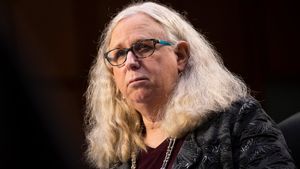When Justin Tranter was awarded Songwriter of the Year at the 2017 BMI Pop Awards, the queer musician used the moment to demand the industry put more women and LGBTQ people in songwriting sessions. It was a simple, straightforward request, but it took the activist and artist his entire life--battling a straight, conservative industry--to have his words taken seriously by music's biggest names.
The former frontman of New York glam-rock outfit Semi Precious Weapons, Tranter never experienced commercial success as a performer, despite touring for years (at one point SPW opened for Lady Gaga during her Monster Ball tour). It was only when he retired his glittery heels and eyeliner for a career behind the scenes that Tranter's lyrics finally made it onto mainstream radio worldwide.
After signing a publishing deal through Warner/Chappell, Tranter began penning some of pop's biggest hits, from Justin Bieber's "Sorry" to Selena Gomez's "Good for You." Now considered an industry heavyweight, he has worked closely with a slew of major artists, including Britney Spears, Gwen Stefani, Maroon 5, DNCE, and Imagine Dragons, all of whom have landed chart-conquering singles with his golden co-write.
Tranter recently talked with his longtime inspiration and current collaborator, Courtney Love, to reflect on their difficulties navigating the music-biz landscape as marginalized artists.
Courtney Love: Are you on vacation?
Justin Tranter: No, I'm in Hawaii with [songwriters] Mattman & Robin. We're going to write for six hours a day--half vacation, half work--and we came with no artists.
CL: Back in my day, when you had to walk to school barefoot in the snow, there was only one studio in all of Hawaii, and it wasn't very good. Is there a cool one there now?
JT: I got in late last night, but the guys were there yesterday and said the studio is great--and there's a view of the ocean. I guess Kanye made a lot of stuff here.
CL: But by the ocean, sometimes the equipment gets weird--that's just my experience. I did it in France, but it was too near Marseille. I've always wanted to record by the ocean, so you're living the dream, baby.
JT: I'm living the dream, girl.
CL: At the BMI Pop Awards, you called for more LGBTQ people to be included in songwriting sessions. Why do you think the community is so underrepresented in the music business?
JT: Because there are systemic problems in our culture when it comes to things that are behind the scenes and viewed as somewhat technical. Even though songwriting isn't technical, the behind-the-scenes songwriter is viewed as a technical position. Queer people are born into a world where we're told those kinds of jobs probably aren't for us.
Related | Justin Tranter at BMI Pop Awards: 'Put More LGBTQ People In Your Sessions'
CL: Like sound techs and engineers... You have a real point. I've never known a queer roadie that was out.
JT: Exactly, and there are more than a thousand queer guys that would love that job, but they're not thinking of it.
CL: On the road, it's such a sexist dude culture. Is it the same in-studio?
JT: It's shocking how few women and LGBTQ people are in the behind-the-scenes world of the studio. There are almost no producers, and the couple of songwriters that exist need to fight harder to get in the room. I think it's like passive homophobia, where people believe I should be able to get married, but [I'm not] the first person they'd think of [to work with] because they're hanging out with their bros all day, and they're gonna put their bros in the session.

CL: Definitely. I've worked with some big producers and it's all bros. I remember a friend of mine, when she got a job doing sound, it was a big deal. I got her on the Nirvana/Breeders tour doing the Breeders' sound, but it was a struggle just to get her on there. Have you experienced homophobia within the music industry yourself?
JT: Homophobia is one of the main reasons I let [Semi Precious Weapons] end after we were a band for 10 years and touring for five years. Toward the end of it, our song "Aviation High" started doing decently well on alternative radio. It was the first time we were doing well on the radio at all. But whether it was label people or management, I would be on a phone call or get an email or text message asking me to be less feminine or less gay because alternative radio was even more bro-y than pop radio--which is true. Alternative radio is nothing but white straight men.
CL: Once in a while, I'll hear myself on KROQ radio, and I'm like, Wait, I gave birth to you, what are you doing? [Laughs] I think my band was integral to KROQ crossing over and becoming a monster power, and now they barely play Hole or any women anymore.
JT: There was a time I was supposed to write with a boy band, who I'll keep nameless. I was so excited because I'd just written [the chorus for] Fall Out Boy's "Centuries," and someone in the group really loved that song, so they asked me to come join this camp they were doing. Everything was set, but I'd never met the A&R before, so I went to meet him before the trip to get the lowdown. I leave and my publisher, Katie Vinten, who's my hero, said he says, "You know what, we don't know if it's the right idea to have Justin in the house with these guys... they're kinda young."
CL: Oh, my God, no! That's so disgusting!
JT: Even though being an LGBTQ person can be awful and we have all these horrible challenges, I think so much of homophobia is based in misogyny. So I'm sure there are parallels to the bullshit we've both gone through, because when it comes down to it, it's all a hatred of the feminine having power.
CL: I never dressed like a dude. I never pretended I was a dude. I had girlfriends who were totally butching it out, and they fit in really well or tried to, but that didn't last. It's so hard... those bros.
JT: I made a conscious decision when I switched careers and went behind the scenes to change the way I look to make people more comfortable so that my music could be heard. In some ways, that makes me feel like I was selling out, and I'm not afraid to say that, but in other ways, my goal was to have the whole world hear my music--and I did it. What's really sad is that within months of me toning down the way I dressed, things started working.
CL: When we first met, you were wearing fabulous Fluevogs, a long dress, and leggings. Was that your off-duty look?
JT: That's because I knew I was safe around you. I knew you wouldn't be upset, intimidated, or weirded out by my femininity. But now it's nice--when I was fortunate enough to win BMI Songwriter of the Year, I had my eyeliner and heels on. I'm able now to feel more confident going back to the things I love, but I definitely dressed to win, and it makes me sick that it works. We live in a patriarchal society, and when there's money to be had, the patriarchy takes over. Looking at behind-the-scenes songwriters, the majority of [successful ones] fall into minority categories: women, LGBTQ people, or people of color. You can see how deep the homophobia, racism, and misogyny is. I know, if I was an executive, I'd [say] every single session should have a minority in it. Not only is that the right thing to do, but it will make more money.

CL: How do you think greater equality can be achieved within the music industry?
JT: The couple of allies I know, who are at the top of labels and publishing companies, actually do what allies need to do, which is listen and open as many doors as possible. The allies I've found--my publisher Katie Vinten, Wendy Goldstein and Charlie Walk at Republic, Aaron Bay-Schuck and John Janick at Interscope--they know I'm an amazing songwriter, but they also know that as a queer person, I bring something special to the table. I bring that underdog perspective and confidence, and they embrace it, open doors for me, and then I deliver.
CL: Do you think the general public cares about the sexuality of pop stars?
JT: I think they do, sadly. If you look at the [LGBTQ] stars we have, the media or their label or their TV network portrays them as very two-dimensional. Sex is never actually involved. Romance is very rarely involved. If it is romance, it's always a love-lost situation. The couple of amazing LGBTQ stars we have started their careers out of the closet, and the ones who do come out later, they're already famous, so they're grandfathered in. I think the general public is really scared of a fully fledged, multidimensional queer person.
CL: I've never written a sex song. They're always, like, fucked-up or about tragic loss. I've never written an actual desire or masturbation song. Does sex sell in music?
JT: Sex sells because everyone has those feelings. For example, "Love Myself" [by Hailee Steinfeld]: Me and Julia, my main co-writer, were in Sweden, and the only way she could stay awake through the jet lag was to masturbate before our session. [Laughs] So we wrote a very honest song about her loving to masturbate. Sex sells because it's relatable, and then when it's honest, it sells even more. I'm definitely a sexual person, and Julia is a sexual person, so we end up writing about it quite a bit.
CL: What's the difference between writing for other artists and when you wrote for yourself or your band?
JT: Now I can write these songs that I relate to in very personal, queer ways, but the public doesn't have to know that. I get to be even freer and not have to worry about what someone is going to think, because when a straight person is singing it, you don't get nearly as much hate. People still suffer hate from assholes on the internet, but the song itself doesn't get torn apart in such a way, which for me is fun because I don't have to worry as much while I write.
CL: How easy is it to tap into the headspace of the other artists you write for? Because some of these people you write for are micromanaged down in a way I can't possibly relate to. When you're in a room with, say, someone who grew up in Disney since age 4, and the publicist and whole team is there, how do you connect to that person's soul?
JT: I'm lucky because my personality is so big and I'm a genuinely loving person, so I have a pretty easy time proving to people they can trust me and proving to their handlers that they can leave the room. [I find] so much joy in trying to really tap into and help other people tell their stories and enhance their vision. The survival skills we all learn as minorities on this planet--whether it's race, gender, or sexuality--I think those can really come in handy. Speaking of survival skills, when you wrote [the 1998 Hole comeback song] "Celebrity Skin," its content was really dark and fucked-up, but the song moves and dances in the way rock music should. Was that a conscious thought?
CL: Oh, yeah. I was like, "This is going to be commercially successful," because I understood the market portions at the time. I understood that within the rock genre, I could borrow from the Beatles and Fleetwood Mac, and I could make a strong pop-rock record, but not compromise one inch of my vision. I knew I was going for 10 million sales, and I got that.
JT: Wow, I'm getting chills.
CL: I'm sure you have the same sense of determinism when you're in the studio with these superstars.
JT: I'm thinking of ways to make sure it's as hooky [and] digestible as possible, and then I find ways to make sure, emotionally, I'm giving women strength or pushing the guy. With Justin Bieber's "Sorry," [we wrote] a song to make him really vulnerable. For me, it's working inside the system, but making sure I push it forward slightly every single time.
CL: It's about looking ahead at trends in music. You push it and make sure there's a little subversive element to it. You have to be ahead of the game if you're in it to win it, and if you're a minority, you have to be twice as good as anybody else.
JT: Isn't it crazy that women are considered minorities even though they're actually the majority? Like, how fucked-up is this world?
CL: It is crazy. [Laughs] Of all the pop stars you've written with, who has surprised you the most?
JT: There are my idols that I've gotten to work with, like you and Gwen Stefani and Glen Ballard. Those moments were like, everything you hoped would happen actually happened. You were in my house chain-smoking on my busted couch, writing the coolest lyrics I'd ever heard in 10 seconds. That lives up. Or the second Gwen steps up to the microphone, it's that iconic voice only she has. But Britney [Spears] really surprised me. Britney had some really cool fucked-up ideas for songs. For one of the songs that ended up on [Glory], "Just Like Me," she was like, "What if we write a song where I'm so excited to go and meet with my man and I walk in and he's hooking up with a girl who looks just like me?" I was like, "OK, Britney Spears. I'll write that song with you. Let's fucking do this."
CL: [Laughs] That's so cool.
JT: Her voice is so iconic, I already knew that was going to happen, but no one ever talks about Britney coming in with crazy lyrical concepts for a song.
CL: With the current Trump administration being on the bro side, my team is saying there's going to be a great punk uprising, like the Reagan era. I heard that a lot at the beginning, before people started getting exhausted. I notice that you never get exhausted on social media, which is great. Continue to resist. How political are you feeling right now?
JT: Oh, girl, you know me. I'm feeling extremely political. I'm really happy that at this moment in my life, I have success and a platform and money to help. My whole life, I've always been political and vocal. But no one was listening until two years ago, so I'm glad I can put my money where my mouth is--and have my mouth be really loud.
Photography Mark Squires
Grooming: Ananda Tuyes









































































